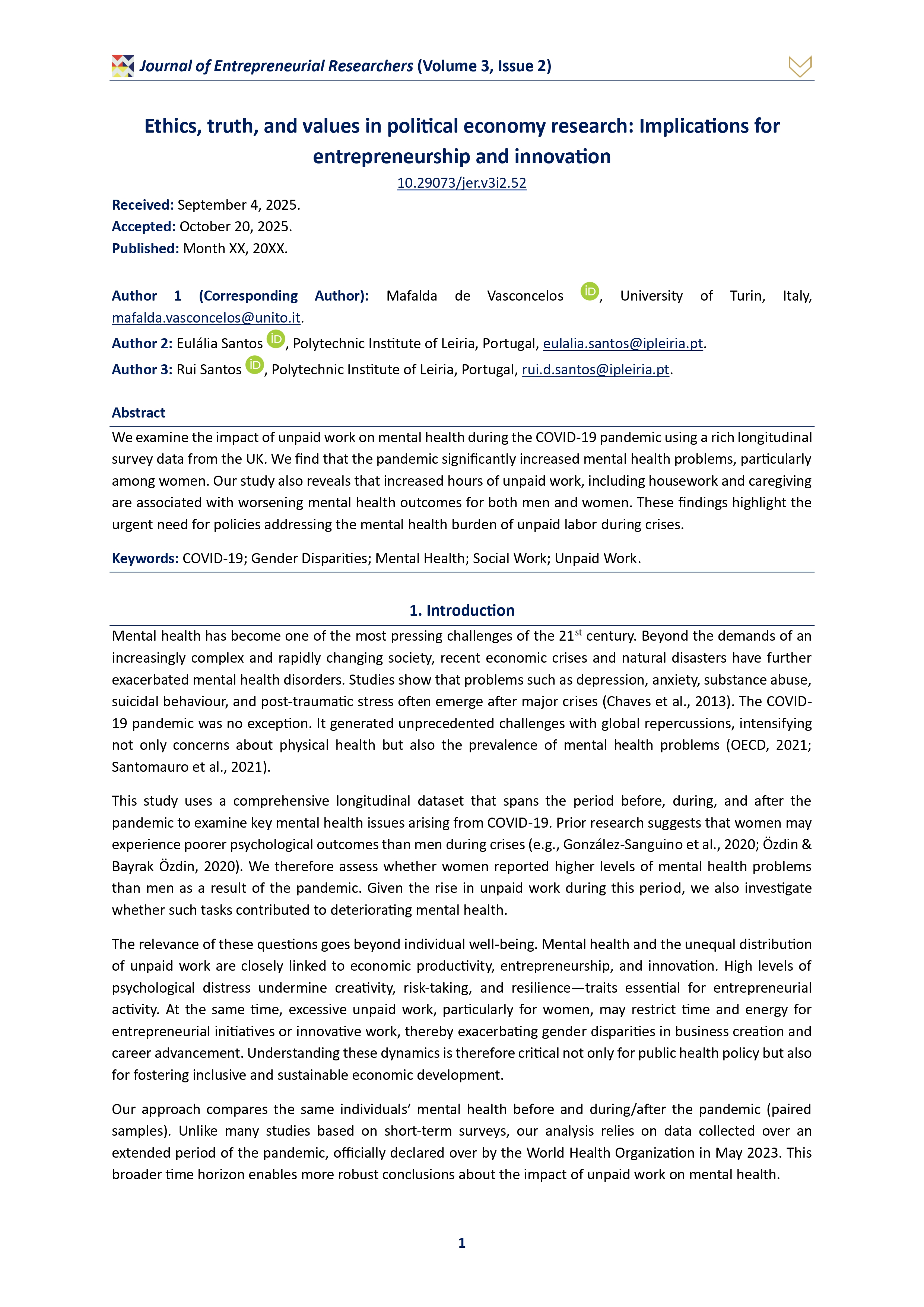Unpaid work and mental health during a pandemic: Evidence from the UK
DOI:
https://doi.org/10.29073/jer.v3i2.52Keywords:
COVID-19, Gender Disparities, Mental Health, Social Work, Unpaid WorkAbstract
We examine the impact of unpaid work on mental health during the COVID-19 pandemic using a rich longitudinal survey data from the UK. We find that the pandemic significantly increased mental health problems, particularly among women. Our study also reveals that increased hours of unpaid work, including housework and caregiving are associated with worsening mental health outcomes for both men and women. These findings highlight the urgent need for policies addressing the mental health burden of unpaid labor during crises.
Downloads
References
Alfonzo, L., et al. (2023). Impact of informal care on the mental health of caregivers during the COVID-19 pandemic. Journal of Public Health, 45(4), e668–e676. https://doi.org/10.1093/pubmed/fdad193
Andrich, D., & van Schoubroeck, L. (1989). The General Health Questionnaire: A psychometric analysis using latent trait theory. Psychological Medicine, 19(2), 469–485. https://doi.org/10.1017/S0033291700012502
Bell, T., Watson, M., Sharp, D., Lyons, I., & Lewis, G. (2005). Factors associated with being a false positive on the General Health Questionnaire. Social Psychiatry and Psychiatric Epidemiology, 40(5), 402–407. https://doi.org/10.1007/s00127-005-0910-2
Centofanti, S., Lushington, K., Wicking, A., Wicking, P., Fuller, A., Janz, P., & Dorrian, J. (2019). Establishing norms for mental well-being in young people (7–19 years) using the General Health Questionnaire-12. Australian Journal of Psychology, 71(2), 117–126. https://doi.org/10.1111/ajpy.12216
Chaves, C., Castellanos, T., Abrams, M., et al. (2018). The impact of economic recessions on depression and individual and social well-being: The case of Spain (2006–2013). Social Psychiatry and Psychiatric Epidemiology, 53(9), 977–986. https://doi.org/10.1007/s00127-018-1558-2
Del Boca, D., Oggero, N., Profeta, P., et al. (2020). Women’s and men’s work, housework and childcare, before and during COVID-19. Review of Economics of the Household, 18(4), 1001–1017. https://doi.org/10.1007/s11150-020-09502-1
Goldberg, D. P. (1972). The detection of psychiatric illness by questionnaire. Oxford University Press.
González-Sanguino, C., Ausín, B., Castellanos, M. Á., Saiz, J., López-Gómez, A., Ugidos, C., & Muñoz, M. (2020). Mental health consequences during the initial stage of the 2020 coronavirus pandemic (COVID-19) in Spain. Brain, Behavior, and Immunity, 87, 172–176. https://doi.org/10.1016/j.bbi.2020.05.040
Hair, J. F., Black, W. C., Babin, B. J., & Anderson, R. E. (2014). Multivariate data analysis (7th ed.). Pearson.
Hatton, C., Emerson, E., Robertson, J., & Baines, S. (2017). The mental health of British adults with intellectual impairments living in general households. Journal of Applied Research in Intellectual Disabilities, 30(1), 188–197. https://doi.org/10.1111/jar.12224
Hayes, D. A. (2014). The relationship between mental wellbeing and financial management among older people. International Longevity Centre — UK.
Hystad, S. W., & Johnsen, B. H. (2020). The dimensionality of the 12-item General Health Questionnaire (GHQ-12): Comparisons of factor structures and invariance across samples and time. Frontiers in Psychology, 11, 1300. https://doi.org/10.3389/fpsyg.2020.01300
Jackson, C. (2007). The General Health Questionnaire. Occupational Medicine, 57(1), 79. https://doi.org/10.1093/occmed/kql169
Kline, R. B. (2016). Principles and practice of structural equation modeling (4th ed.). Guilford Press.
Madia, J., et al. (2023). Studying informal care during the pandemic: Mental health, gender and job status. Economics & Human Biology, 50, 101245. https://doi.org/10.1016/j.ehb.2023.101245
Marôco, J. (2018). Análise estatística com o SPSS Statistics 25. Report Number.
Organisation for Economic Co-operation and Development (OECD). (2021). Tackling the mental health impact of the COVID-19 crisis: An integrated, whole-of-society response. OECD Publishing. https://doi.org/10.1787/0ccafa0b-en
Özdin, S., & Bayrak Özdin, Ş. (2020). Levels and predictors of anxiety, depression and health anxiety during COVID-19 pandemic in Turkish society: The importance of gender. The International Journal of Social Psychiatry, 66(5), 504–511. https://doi.org/10.1177/0020764020927051
Pestana, M. H., & Gageiro, J. N. (2014). Análise de dados em ciências sociais – A complementaridade do SPSS. Sílabo.
Pinquart, M., & Sörensen, S. (2007). Correlates of physical health of informal caregivers: A meta-analysis. The Journals of Gerontology: Series B, Psychological Sciences and Social Sciences, 62(2), 126–137. https://doi.org/10.1093/geronb/62.2.p126
Politi, P. L., Piccinelli, M., & Wilkinson, G. (1994). Reliability, validity and factor structure of the 12-item General Health Questionnaire among young males in Italy. Acta Psychiatrica Scandinavica, 90(6), 432–437. https://doi.org/10.1111/j.1600-0447.1994.tb01620.x
Robinson, J., & Spitze, G. (1992). Whistle while you work? The effect of household task performance on women’s and men’s well-being. Social Science Quarterly, 73(4), 844–861.
Santomauro, D. F., et al. (2021). Global prevalence and burden of depressive and anxiety disorders in 204 countries and territories in 2020 due to the COVID-19 pandemic. The Lancet, 398(10312), 1700–1712. https://doi.org/10.1016/S0140-6736(21)02143-7
University of Essex, Institute for Social and Economic Research. (2023). Understanding Society: Waves 1–13, 2009–2022 and harmonised BHPS: Waves 1–18, 1991–2009 (18th ed.) [Data collection]. UK Data Service. https://doi.org/10.5255/UKDA-SN-6614-19
Xue, B., & McMunn, A. (2021). Gender differences in unpaid care work and psychological distress in the UK COVID-19 lockdown. PLOS ONE, 16(3), e0247959. https://doi.org/10.1371/journal.pone.0247959

Downloads
Published
How to Cite
Issue
Section
License
Copyright (c) 2025 Journal of Entrepreneurial Researchers

This work is licensed under a Creative Commons Attribution 4.0 International License.






